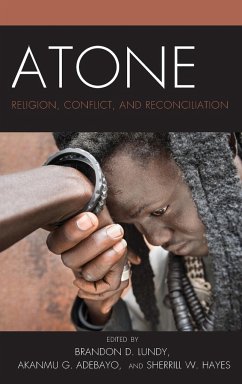Atone
Religion, Conflict, and Reconciliation
Herausgeber: Lundy, Brandon D.; Hayes, Sherrill; Adebayo, Akanmu G.
Atone
Religion, Conflict, and Reconciliation
Herausgeber: Lundy, Brandon D.; Hayes, Sherrill; Adebayo, Akanmu G.
- Gebundenes Buch
- Merkliste
- Auf die Merkliste
- Bewerten Bewerten
- Teilen
- Produkt teilen
- Produkterinnerung
- Produkterinnerung
This volume engages the unseen impacts of religion-linked conflicts and successful peacebuilding around the world. The authors address the paradoxes of the role of religion in global conflicts to reveal the connections among religion, conflict, and peace.
Andere Kunden interessierten sich auch für
![Strategic Intelligence-Community Security Partnerships Strategic Intelligence-Community Security Partnerships]() Maiwa'Azi Dandaura-SamuStrategic Intelligence-Community Security Partnerships157,99 €
Maiwa'Azi Dandaura-SamuStrategic Intelligence-Community Security Partnerships157,99 €![Fighting in God's Name Fighting in God's Name]() Fighting in God's Name144,99 €
Fighting in God's Name144,99 €![Jihadism Jihadism]() Nirode MohantyJihadism160,99 €
Nirode MohantyJihadism160,99 €![The Spectre of Islamic Terrorism: Comparative Insights The Spectre of Islamic Terrorism: Comparative Insights]() The Spectre of Islamic Terrorism: Comparative Insights90,99 €
The Spectre of Islamic Terrorism: Comparative Insights90,99 €![The Political Economy of Kidnapping and Insecurity in Nigeria The Political Economy of Kidnapping and Insecurity in Nigeria]() The Political Economy of Kidnapping and Insecurity in Nigeria97,99 €
The Political Economy of Kidnapping and Insecurity in Nigeria97,99 €![Turbulent Afghanistan Turbulent Afghanistan]() Pamir Halimzai SahillTurbulent Afghanistan195,99 €
Pamir Halimzai SahillTurbulent Afghanistan195,99 €![Africa's Soft Power Africa's Soft Power]() Oluwaseun TellaAfrica's Soft Power195,99 €
Oluwaseun TellaAfrica's Soft Power195,99 €-
-
-
This volume engages the unseen impacts of religion-linked conflicts and successful peacebuilding around the world. The authors address the paradoxes of the role of religion in global conflicts to reveal the connections among religion, conflict, and peace.
Hinweis: Dieser Artikel kann nur an eine deutsche Lieferadresse ausgeliefert werden.
Hinweis: Dieser Artikel kann nur an eine deutsche Lieferadresse ausgeliefert werden.
Produktdetails
- Produktdetails
- Verlag: Lexington Books
- Seitenzahl: 366
- Erscheinungstermin: 26. Februar 2018
- Englisch
- Abmessung: 235mm x 157mm x 26mm
- Gewicht: 744g
- ISBN-13: 9781498560689
- ISBN-10: 1498560687
- Artikelnr.: 50438799
- Herstellerkennzeichnung
- Libri GmbH
- Europaallee 1
- 36244 Bad Hersfeld
- gpsr@libri.de
- Verlag: Lexington Books
- Seitenzahl: 366
- Erscheinungstermin: 26. Februar 2018
- Englisch
- Abmessung: 235mm x 157mm x 26mm
- Gewicht: 744g
- ISBN-13: 9781498560689
- ISBN-10: 1498560687
- Artikelnr.: 50438799
- Herstellerkennzeichnung
- Libri GmbH
- Europaallee 1
- 36244 Bad Hersfeld
- gpsr@libri.de
Brandon D. Lundy is associate professor of anthropology and associate director in the School of Conflict Management, Peacebuilding and Development at Kennesaw State University. Akanmu G. Adebayo is professor of history at Kennesaw State University. Sherrill W. Hayes is professor and associate director of the School of Conflict Management, Peacebuilding, and Development at Kennesaw State University.
Tables Preface and Acknowledgments
by Brandon D. Lundy
Akanmu G. Adebayo
and Sherrill W. Hayes Introduction: Examining the Paradoxical Role of Religion in Conflict and Reconciliation
by Brandon D. Lundy
Ziaul Haque
Akanmu G. Adebayo
Sherrill W. Hayes
and Aaron Clarke Part I: Reconciling Religious Conflicts Chapter 1: Sources of the Radical Self: Extremism
Modernity
and Religion
by Daniel Cere Chapter 2: Education
Religion
and Religious Extremism
by Ratna Ghosh Chapter 3: Revisiting Muslim Identity and Islamophobia in the Contemporary World
by Dilmurat Mahmut Chapter 4: The Limits of Law in Resolving Religious Conflicts: Perspectives from Nigeria and Beyond
by Abiodun Odusote Chapter 5: Transnational Insurgency and Counterinsurgency around the Lake Chad Basin: Rethinking Boko Haram
by Olatunde O. Taiwo Chapter 6: Land Use and Religious Movements: Entangled Spaces and Impending Conflict along Lagos-Ibadan Expressway
Nigeria
by Monsuru O. Muritala Part II: Reconciling Conflict through Religion Chapter 7: Islamic Approach to Abrahamic Traditions
by Jusuf Salih Chapter 8: How Mysticism Can Point the Way to Tolerance: Recognizing a Common Ground of Non-conceptual Experience in Meister Eckhart and Zen
by D. Clint Johnson Chapter 9: Reconciliation: Examining the Charleston AME Tragedy Victims' Forgiveness of Dylann Roof
by Chux Ibekwe Chapter 10: Truth
Justice
and Reconciliation Commission in Togo: A Useful Tool for Regime Maintenance or for Healing the Wounds of the Past for Peaceful Democratic Alternations? by Edoh Agbehonou Chapter 11: Faith-Based Organizations and Refugee Women: A Case Study of the Assistance Provided by Faith-Based and Other Organization to Liberian Women Refugees in Ghana
by Joyce D. Acquah Chapter 12: Religious Songs in Conflict Situation: An Interrogation of Selected Yorùbá Coded Church Songs
by Dolapo Z. Olupayimo Chapter 13: Halal in Context: A Reconciliation of Muslim Foodways and Animal Welfare in Islam
by Sherrie D. Alexander Chapter 14: Testing the Co-Religionist Hypothesis in Sri Lanka
by Joel Elliott and Joseph G. Bock Chapter 15: The Role of the Catholic Church in Managing Interstate Conflict: An Examination of the Intervention of Pope Francis in Cuba-U.S. Relations
by John B. Idamkue Part III: Religious Reconciliations Chapter 16: A Pope
a Patriarch
a Spiritual Revolution
by Johan Galtung Chapter 17: Searching for Shalom
by Albert Slomovitz Chapter 18: Framing Conflict and Reconciliation in the Context of Zen Buddhism
by Michael J. Elliston Chapter 19: Soka Nichiren Buddhism
by Julian Godwin Chapter 20: Religious Resources for Reconciliation
by Tom Pynn
by Brandon D. Lundy
Akanmu G. Adebayo
and Sherrill W. Hayes Introduction: Examining the Paradoxical Role of Religion in Conflict and Reconciliation
by Brandon D. Lundy
Ziaul Haque
Akanmu G. Adebayo
Sherrill W. Hayes
and Aaron Clarke Part I: Reconciling Religious Conflicts Chapter 1: Sources of the Radical Self: Extremism
Modernity
and Religion
by Daniel Cere Chapter 2: Education
Religion
and Religious Extremism
by Ratna Ghosh Chapter 3: Revisiting Muslim Identity and Islamophobia in the Contemporary World
by Dilmurat Mahmut Chapter 4: The Limits of Law in Resolving Religious Conflicts: Perspectives from Nigeria and Beyond
by Abiodun Odusote Chapter 5: Transnational Insurgency and Counterinsurgency around the Lake Chad Basin: Rethinking Boko Haram
by Olatunde O. Taiwo Chapter 6: Land Use and Religious Movements: Entangled Spaces and Impending Conflict along Lagos-Ibadan Expressway
Nigeria
by Monsuru O. Muritala Part II: Reconciling Conflict through Religion Chapter 7: Islamic Approach to Abrahamic Traditions
by Jusuf Salih Chapter 8: How Mysticism Can Point the Way to Tolerance: Recognizing a Common Ground of Non-conceptual Experience in Meister Eckhart and Zen
by D. Clint Johnson Chapter 9: Reconciliation: Examining the Charleston AME Tragedy Victims' Forgiveness of Dylann Roof
by Chux Ibekwe Chapter 10: Truth
Justice
and Reconciliation Commission in Togo: A Useful Tool for Regime Maintenance or for Healing the Wounds of the Past for Peaceful Democratic Alternations? by Edoh Agbehonou Chapter 11: Faith-Based Organizations and Refugee Women: A Case Study of the Assistance Provided by Faith-Based and Other Organization to Liberian Women Refugees in Ghana
by Joyce D. Acquah Chapter 12: Religious Songs in Conflict Situation: An Interrogation of Selected Yorùbá Coded Church Songs
by Dolapo Z. Olupayimo Chapter 13: Halal in Context: A Reconciliation of Muslim Foodways and Animal Welfare in Islam
by Sherrie D. Alexander Chapter 14: Testing the Co-Religionist Hypothesis in Sri Lanka
by Joel Elliott and Joseph G. Bock Chapter 15: The Role of the Catholic Church in Managing Interstate Conflict: An Examination of the Intervention of Pope Francis in Cuba-U.S. Relations
by John B. Idamkue Part III: Religious Reconciliations Chapter 16: A Pope
a Patriarch
a Spiritual Revolution
by Johan Galtung Chapter 17: Searching for Shalom
by Albert Slomovitz Chapter 18: Framing Conflict and Reconciliation in the Context of Zen Buddhism
by Michael J. Elliston Chapter 19: Soka Nichiren Buddhism
by Julian Godwin Chapter 20: Religious Resources for Reconciliation
by Tom Pynn
Tables Preface and Acknowledgments
by Brandon D. Lundy
Akanmu G. Adebayo
and Sherrill W. Hayes Introduction: Examining the Paradoxical Role of Religion in Conflict and Reconciliation
by Brandon D. Lundy
Ziaul Haque
Akanmu G. Adebayo
Sherrill W. Hayes
and Aaron Clarke Part I: Reconciling Religious Conflicts Chapter 1: Sources of the Radical Self: Extremism
Modernity
and Religion
by Daniel Cere Chapter 2: Education
Religion
and Religious Extremism
by Ratna Ghosh Chapter 3: Revisiting Muslim Identity and Islamophobia in the Contemporary World
by Dilmurat Mahmut Chapter 4: The Limits of Law in Resolving Religious Conflicts: Perspectives from Nigeria and Beyond
by Abiodun Odusote Chapter 5: Transnational Insurgency and Counterinsurgency around the Lake Chad Basin: Rethinking Boko Haram
by Olatunde O. Taiwo Chapter 6: Land Use and Religious Movements: Entangled Spaces and Impending Conflict along Lagos-Ibadan Expressway
Nigeria
by Monsuru O. Muritala Part II: Reconciling Conflict through Religion Chapter 7: Islamic Approach to Abrahamic Traditions
by Jusuf Salih Chapter 8: How Mysticism Can Point the Way to Tolerance: Recognizing a Common Ground of Non-conceptual Experience in Meister Eckhart and Zen
by D. Clint Johnson Chapter 9: Reconciliation: Examining the Charleston AME Tragedy Victims' Forgiveness of Dylann Roof
by Chux Ibekwe Chapter 10: Truth
Justice
and Reconciliation Commission in Togo: A Useful Tool for Regime Maintenance or for Healing the Wounds of the Past for Peaceful Democratic Alternations? by Edoh Agbehonou Chapter 11: Faith-Based Organizations and Refugee Women: A Case Study of the Assistance Provided by Faith-Based and Other Organization to Liberian Women Refugees in Ghana
by Joyce D. Acquah Chapter 12: Religious Songs in Conflict Situation: An Interrogation of Selected Yorùbá Coded Church Songs
by Dolapo Z. Olupayimo Chapter 13: Halal in Context: A Reconciliation of Muslim Foodways and Animal Welfare in Islam
by Sherrie D. Alexander Chapter 14: Testing the Co-Religionist Hypothesis in Sri Lanka
by Joel Elliott and Joseph G. Bock Chapter 15: The Role of the Catholic Church in Managing Interstate Conflict: An Examination of the Intervention of Pope Francis in Cuba-U.S. Relations
by John B. Idamkue Part III: Religious Reconciliations Chapter 16: A Pope
a Patriarch
a Spiritual Revolution
by Johan Galtung Chapter 17: Searching for Shalom
by Albert Slomovitz Chapter 18: Framing Conflict and Reconciliation in the Context of Zen Buddhism
by Michael J. Elliston Chapter 19: Soka Nichiren Buddhism
by Julian Godwin Chapter 20: Religious Resources for Reconciliation
by Tom Pynn
by Brandon D. Lundy
Akanmu G. Adebayo
and Sherrill W. Hayes Introduction: Examining the Paradoxical Role of Religion in Conflict and Reconciliation
by Brandon D. Lundy
Ziaul Haque
Akanmu G. Adebayo
Sherrill W. Hayes
and Aaron Clarke Part I: Reconciling Religious Conflicts Chapter 1: Sources of the Radical Self: Extremism
Modernity
and Religion
by Daniel Cere Chapter 2: Education
Religion
and Religious Extremism
by Ratna Ghosh Chapter 3: Revisiting Muslim Identity and Islamophobia in the Contemporary World
by Dilmurat Mahmut Chapter 4: The Limits of Law in Resolving Religious Conflicts: Perspectives from Nigeria and Beyond
by Abiodun Odusote Chapter 5: Transnational Insurgency and Counterinsurgency around the Lake Chad Basin: Rethinking Boko Haram
by Olatunde O. Taiwo Chapter 6: Land Use and Religious Movements: Entangled Spaces and Impending Conflict along Lagos-Ibadan Expressway
Nigeria
by Monsuru O. Muritala Part II: Reconciling Conflict through Religion Chapter 7: Islamic Approach to Abrahamic Traditions
by Jusuf Salih Chapter 8: How Mysticism Can Point the Way to Tolerance: Recognizing a Common Ground of Non-conceptual Experience in Meister Eckhart and Zen
by D. Clint Johnson Chapter 9: Reconciliation: Examining the Charleston AME Tragedy Victims' Forgiveness of Dylann Roof
by Chux Ibekwe Chapter 10: Truth
Justice
and Reconciliation Commission in Togo: A Useful Tool for Regime Maintenance or for Healing the Wounds of the Past for Peaceful Democratic Alternations? by Edoh Agbehonou Chapter 11: Faith-Based Organizations and Refugee Women: A Case Study of the Assistance Provided by Faith-Based and Other Organization to Liberian Women Refugees in Ghana
by Joyce D. Acquah Chapter 12: Religious Songs in Conflict Situation: An Interrogation of Selected Yorùbá Coded Church Songs
by Dolapo Z. Olupayimo Chapter 13: Halal in Context: A Reconciliation of Muslim Foodways and Animal Welfare in Islam
by Sherrie D. Alexander Chapter 14: Testing the Co-Religionist Hypothesis in Sri Lanka
by Joel Elliott and Joseph G. Bock Chapter 15: The Role of the Catholic Church in Managing Interstate Conflict: An Examination of the Intervention of Pope Francis in Cuba-U.S. Relations
by John B. Idamkue Part III: Religious Reconciliations Chapter 16: A Pope
a Patriarch
a Spiritual Revolution
by Johan Galtung Chapter 17: Searching for Shalom
by Albert Slomovitz Chapter 18: Framing Conflict and Reconciliation in the Context of Zen Buddhism
by Michael J. Elliston Chapter 19: Soka Nichiren Buddhism
by Julian Godwin Chapter 20: Religious Resources for Reconciliation
by Tom Pynn








